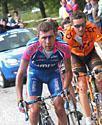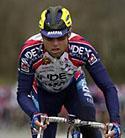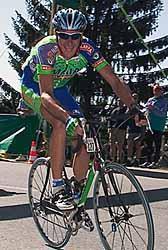First Edition News for May 19, 2003Edited by Jeff Jones & John Stevenson 86th Giro d'Italia newsStage 8 wrap-up: Cipollini...finally
The power was back in Mario Cipollini's legs today as he won the eighth stage of the Giro d'Italia between Rieti and Arezzo. After once again being given a textbook leadout from his Domina Vacanze teammates, Super Mario did not let them down, powering off Giovanni Lombardi with 250m to go to cross the line with half a wheel to spare over Robbie McEwen and Alessandro Petacchi, who both did their utmost to get around him. Petacchi tried jumping early as he did the other day, but this time he was overtaken by Cipollini. "Finally I did it!" exclaimed a delighted Cipollini as he was mobbed on viale Giotto after his win. "It was really great to return home (to Tuscany) and win here." The stage was primarily ridden at a steady tempo, with the Vini Caldirola team controlling the pace for race leader Stefano Garzelli. After the Intergiro sprint at km 167, a group of six managed to escape, including Ukrainian Sergiy Adyeyev (Landbouwkrediet), who soloed off the front of the break only to be caught by the peloton with 15 km to go. Then it was primarily Domina Vacanze, Fassa Bortolo and Lotto-Domo, with some help from Mercatone Uno and Saeco to lead the bunch home. In winning this stage, Mario Cipollini equaled the Giro stage win record of Alfredo Binda, which has stood at 41 stage wins for over 70 years. Stage 8 full results and
report More reactions from stage 7Pellizotti and Noè battle hard
Alessio had a good day on the Terminillo climb in Stage 7 with Andrea Noè finishing third, 2 seconds behind Garzelli, and Franco Pellizotti ending as eight, at 53 seconds. "I'm satisfied with the way things went, even though I thought I would go better," said Pellizotti to La Gazzetta dello Sport. "It was really hard on the climb. I managed to hang on the end and didn't lose a lot. The last two weeks I hadn't ridden any climbs so it was hard to find my rhythm. I don't think Alessio is a chance to get the Maglia Rosa but I think we'll be ahead in the hard stages to come." Teammate Noè added, "I felt good and I had good legs yesterday. So I'm satisfied with the way things went. I think there'll probably be new chances to do things in the mountains." Good ride by PopovychSecond year pro Yaroslav Popovych (Colnago-Landbouwkrediet) lost only a minute to Garzelli as he crossed the line in 9th place. The Ukrainian said that "I was really happy the way I went, yes. On the climb, I stayed with the first guys for a long time. And I only got dropped when Simoni made some tremendous accelerations. At that point I just tried to ride my own tempo and keep them in sight. Garzelli and Simoni were really brilliant yesterday. I was surprised that Casagrande got dropped. But we're only at the beginning of the Giro and I'm happy I started on the right foot." Gonzalez and Frigo's no-show in TerminilloBoth Fassa Bortolo's Aitor Gonzalez and Dario Frigo did not have good days in the seventh stage, which finished atop the climb of Terminillo. Gonzalez came in 39th, 5'47 down, while Frigo finished 48th at 6'17. Both riders lost any hope of winning the Giro on that climb, after Vini Caldirola's Eddy Mazzoleni burned nearly everyone off at the bottom with his hard tempo. "The others attacked really hard on the climb right away," said Frigo in La Gazzetta dello Sport. "I tried to stay with them but it was impossible. I had really bad legs yesterday." Gonzalez was visibly suffering too. "I know really well that now I can kiss my Giro goodbye," he said, unable to explain why. "But I just couldn't go yesterday. I was with Frigo for a while then we were both dropped. I'm really sorry. My shoulder was bothering me from Friday's crtash but that wasn't really the problem. The pace was so strong that I couldn't breathe. I couldn't do any more - it seemed like I had really small lungs." "For both me and Dario it's a really tough moment. I'm sorry because we both came here to do a good Giro and things aren't going well." Pantani not satisfiedMarco Pantani didn't go as well as he hoped yesterday, counting on losing not more than a minute and a half. He finished 3'46 down in 25th place after suffering the whole way up. "I said that the road was going to have its say yesterday, and that's the way it was," Pantani told La Gazzetta. "I suffered a lot on the climb and I came away in the first big hit. But I also saw a lot of favourites besides Aitor and Frigo in difficulties, like Casagrande." "Personally I thought I would do better, but as soon as we started the climb with really fast rhythm I just decided to do it at my own pace." Nor was Casagrande
Lampre's Francesco Casagrande (12th at 2'33) also lameneted his poor performance. "I got dropped right away and I realised it wasn't a good day for me. I felt really tired so I just ride my own pace. I hope it's just one bad day and not more, but it's really a long Giro. I tried to limit the time I lost but luckily I had Belli to help me." "In theory we should have all stayed together but [direttore sportivo] Algeri wanted to keep Rumsas ahead. But I couldn't do anything anyway. Looking ahead I hope things go better." Casagrande's Lampre director Pietro Algeri was also not happy. "I was disappointed in Casagrande," he said. "I thought he would be there with Garzelli and Simoni at the end." Giro brings Hamburger close to faktaBy Ole Ryborg
Participation in this year's Giro d'Italia seems to have had a very positive impact on the Danish fakta team, known for the Giro as fakta-Pata Chips. Fakta's director of sport Kim Andersen, who wore the yellow jersey in the Tour de France during his pro years, told Danish media that the team has had very positive signals from its sponsors when it comes to discussion of the team's continuation into the next season. "During the first few days of the Giro, I have had concrete and positive signals from Nalini [clothes sponsor], Pinarello [cycle sponsor] and Pata Chips," Andersen told Danish newspaper Ekstra Bladet. "So I have a good feeling that the team will also exist next season." Asked about a possible cooperation between fakta and Danish rider Bo Hamburger who now rides for Formaggi Pinzolo, Andersen indicated that he has a serious interest in Hamburger. "Bo seems to be riding very well and could end in the top ten," said Andersen. "I cannot predict whether that could lead to a contract with us but we are very open and we think that he deserves a fair chance." Hamburger is reported to be earning a very low salary at his Italian team and had to find his own sponsors in order to be able to continue riding this season. Hamburger has been somewhat in the wilderness since acquiring the dubious distinction of being the first rider to test positive for EPO while riding for CSC back in 2001. That test finding was eventually rejected by the Danish Cycling Federation which ruled the tests had not been conducted properly, but until recently the incident has firmly put the brakes on Hamburger's career. Hamburger has previously said that he sees the Giro as a chance to find a new employer for next season. If that doesn't happen, he plans to return to education to study alternative medicine - a discipline that Hamburger was introduced to by Bjarne Riis. Germany takes overall, Australia the roundBy Gerard Knapp The host nation may have scored the most points and finished at the top of the medals table at the end of the fourth and final round of the UCI Track World Cup at Sydney's Dunc Gray Velodrome, but Germany won the overall award for the nation with the most points in all four rounds of the UCI's Track World Cup. The major victory for the German team was built up over solid performances in each of the rounds, which were held in Moscow (Russia), Aguascalientes (Mexico), Capetown (South Africa) and capped off at the Dunc Gray Velodrome in Sydney. Germany finished with 379 points, while Australia's performance in Sydney helped the country move from fourth to second overall on 336 points, while France dropped into third with 288 points. Points were awarded for all events at all four rounds of the UCI's Track World Cup, with individual point scores in each competition (see list below). The final day of competition in Sydney saw Great Britain and Japan win their first gold medals of the round, in the women's 10km scratch race and men's team sprint, respectively. The other gold medals on offer were won by Australia in the women's team sprint and Germany in the men's 40km Madison. English sprinter Victoria Pendleton stole the show in the women's 10km scratch race, her first-ever scratch race in international competition. "This is a real surprise," said Pendleton, a 22 year-old from London who is currently training at the UCI's World Cycling Centre in Switzerland under French legend Frederic Magne. "It's my first international scratch race, and I've come first!" Pendleton out-sprinted Australian's Rochelle Gilmore and New Zealand's Sarah Ulmer to take the gold, but Gilmore was back some ten minutes later to lead out Kerrie Meares and Rosealee Hubbard to snare gold in the women's team sprint. "I was really upset after losing the scratch race," said the Australian, "and I wanted to give them (Meares and Hubbard) a good lead-out as I knew they were capable of winning it." The Japanese trio of Toshiaki Fushimi, Kiyofumi Nagai and Tomohiro Nagatsuka had a agonizing wait as judges compared hand-timing to determine the winner of the final in the men's team sprint after the automated timing system stalled just as the gold medal final started. Eventually, they were given the win over Australia by 17/100ths of a second, with a time of 45.43. A missed hand-sling on the final lap may have cost Australia the gold medal in the thrilling final event of the round, the men's 40km Madison. Australia's Rodney McGee had put in a huge two-lap turn to set up his teammate Darren Young for the final sprint, but South Africa's JP Van Zyl came between the two riders as they were about to change over and he went on to take the final sprint. The Australians were left to rue the missed change, while Van Zyl's move had little impact on the final overall point score, but apparently was enough for South Africa to qualify for this event at the world championships to be held in Stuttgart later this year. Earlier in the race, the German duo of Guido Fulst and Andreas Muller had worked with Australia's McGee and Young, as well as the Netherlands' Gideon De Jong and Geert Jan Jonkman, to lap the field in the middle of the event, and that was how they ended up on the podium, with Germany first, Australia second and the Netherlands third. The final medals tally saw the Australians come away with four gold, five silver and three bronze. The UCI has also introduced an overall point score system for each track event contested at the four round of the Track world Cup. The winners for 2003 are: men's individual pursuit - Haydn Godfrey (New Zealand); men's 1km time trial - Stefan Nimke (Germany); men's points race - Mikhail Ignatiev (Russia); men's sprint - Mark French (Australia); women's sprint - Daniela Larreal (Venezuela); men team pursuit - Germany; women's individual pursuit - Sarah Ulmer; men's keirin - Josiah Ng Oon (Malaysia); women's points race - Vera Carrara (Italy); women's 500m time trial - Natallia Tsylinskaya (Belarus); women's keirin - Celine Nivert (France); men's scratch - Roland Garber (Austria); women's scratch race - Gema Pasqual (Spain); men's team sprint - Japan; women's team sprint - Russia. See our Track World Cup section for detailed reports, photos and full results. Van Steenbergen to be buried next SaturdayThe recently deceased Belgian and road legend Rik Van Steenbergen will be buried at noon next Saturday, May 24 in Sint-Pauwelskerk in Westmalle. The church is just opposite the cafe where he and his wife Doreen met in 1970, and she called his burial there a "closing of the circle." During the next week, people can pay their last respects to Van Steenbergen in the mortuary of the Eeuwfeestkliniek in Antwerp where he died. Related stories: Rik Van Steenbergen dies, Farewell, Rik I Francisco Perez: Working on the highwayJoao Cravo takes a look at a promising young Spanish rider who has rocketed up the UCI rankings this year to 14th place on the 2003 Top 100 standings.
During the Tour de Romandie, Eurosport commentator and French ex-pro Jean-François Bernard adapted a phrase from rock critic Jon Landau to show how impressed he was by a young rider who has leapt up the UCI rankings in the last few months. Echoing Landau's "I saw the future of rock 'n' roll. And its name is Bruce Springsteen," former La Vie Claire, Toshiba and Banesto rider Bernard announced, "Today I saw the next Armstrong. And his name is [Francisco] Perez." Even if Perez never climbs quite as high as Armstrong, to move up 814 positions on UCI rankings in a mere 18 months is worthy of attention. Just two and a half years ago, Perez didn't seem like much of a prospect. He finished the 2000 season 575th in the Spanish under 23 rankings, a long way behind his team-mates on the Kelme development squad, Carlos Garcia Quesada (10th) and Alejandro Valverde (11th). Perez wasn't exactly surprised when Kelme didn't move him up to its pro team, citing his "lack of results". Disappointed but not beaten, Perez moved to Portugal to try and make a living out of racing, and things began to improve for him. In his first professional season, riding for the Division III Gresco-Tavira team, Francisco Perez got 32 UCI points and finished 2001 ranked as the world's 862nd best rider. In 2002, Gresco-Tavira become Porta da Ravessa-Zurich and registered itself as a Division II team. The squad's upgrade heralded a further improvement in Perez' fortunes and his big step up came on August 11, 2002. In his adopted country's national race, the Volta a Portugal, the climb of the Serra da Estrela to Torre carries as much mythic weight as the Ventoux. Francisco Perez turned in an amazing climbing performance that day and surprised everyone by finishing fourth behind Claus Moller (who would go on to win the race), Rui Sousa and another talented but little-known Portuguese climber Nuno Ribeiro. Perhaps more signicantly, Perez finished well ahead of top class riders such as Angel Casero, Félix Garcia Casas, David Plaza, Juan Manuel Garate, Tomasz Brozyna, and Luis Perez. That day's work by the young climber was noticed by Milaneza-MSS team manager Manuel Zeferino, and at the end of 2002 Perez signed for Zeferino's team, climbing from Division III to Division I in two seasons and moving up 471 positions on UCI rankings. Most of us really noticed Perez when he finished second behind Laurent Brochard on the hilly second stage of the Critérium International back in March, but the Spaniard had already recorded a seventh position in the Volta ao Algarve before finishing the Vuelta a la Comunidad Valenciana in tenth place, which was also his final GC place in the Critérium International. Then, a few weeks later, he recorded his first UCI win, taking out the GP Mitsubishi by just four seconds over team-mate Angel Edo. Then came the Tour de Romandie with a sort-of victory in stage 3 and an indisputable win in stage 4 - and Jean-François Bernard's enthusiastic endorsement. Francisco Perez is now the world number 48 on UCI points, and 14th in the 2003 Top 100, but now things are likely to get tougher for him. The Spanish climber might have made it look easy to breeze up 814 steps on the UCI ladder and 633 points in just 18 months, but he and his team know that each step up and each point will be harder from now on. Perez' biggest weakness is probably the time trial, and it was his relative lack of ability against the clock that moved him off the podium from second to tenth in the Critérium International and even more devastatingly, lost him the yellow jersey at Romandie to Tyler Hamilton. But he may not stay weak in the TTs for long, or in his other problem area as team manager Manuel Zeferino explained to Cyclingnews: "Francisco is a 1.90m tall rider. Climbs with too much gradient are yet too hard for him. But we're working on it, don't worry." Can Zeferino and Perez deliver? Perez' record of improvement is undoubtedly impressive: 575th in the Spanish Espoirs to 48th in the world in 30 months; "lack of results" to two successive mountain stage wins in a 2.HC race. Francisco Perez might just be the future of rock 'n' roll. (All rights reserved/Copyright Knapp Communications Pty Limited 2003) |

|
January 2009 |
Recently on Cyclingnews.com |





